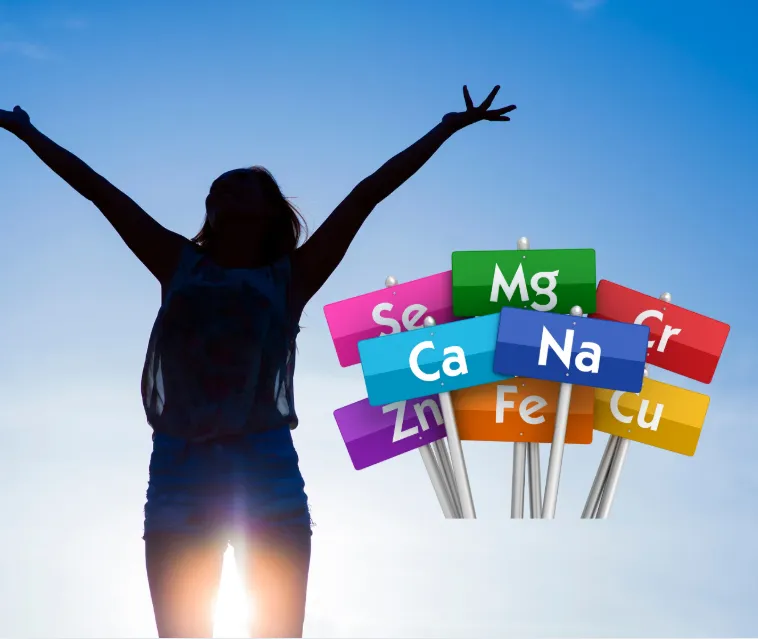
The Role of Minerals in Mental Clarity
If you’re trying to improve your focus, mood, or mental stamina, but nothing seems to be working—there’s a good chance you’re missing the most basic ingredient of brain function: minerals.
Most people overlook minerals when it comes to brain health. But these essential nutrients are the foundation of every thought, memory, and emotion you experience. Without them, your brain literally can’t fire.
Let’s look at the minerals your brain needs to function, how deficiencies show up, and what you can do to replenish them in a way that actually makes a difference.
Your Brain Is Electric—and Minerals Power the Circuit
Your entire nervous system runs on electricity. Every message your brain sends—whether it’s forming a memory, regulating your mood, or solving a problem—depends on electrical signals passing between neurons.
Those signals only work when key minerals are present. Electrolytes like magnesium, sodium, potassium, and calcium act as conductors. They open and close channels in your brain cells to allow communication.
When those minerals are low, messages slow down or don’t transmit at all. That can show up as:
Difficulty concentrating
Mental fog or sluggish thinking
Mood swings or irritability
Fatigue that doesn’t improve with rest
Slow reaction time or forgetfulness
Let’s dig into the minerals that matter most.
Magnesium: The Calming, Clarity-Boosting Mineral
Magnesium is one of the most common deficiencies I see—and one of the most impactful for brain health. It supports over 300 biochemical reactions, including:
Producing neurotransmitters like serotonin and GABA
Calming the nervous system and reducing anxiety
Protecting the brain from overstimulation and sensory overload
When magnesium is low, you may feel tense, overstimulated, easily distracted, or anxious for no clear reason. It’s also linked to migraines, poor sleep, and hormone imbalances that affect mental clarity.
You can get magnesium from leafy greens, pumpkin seeds, avocados, and dark chocolate. But food alone often isn’t enough—especially if you’re under stress, drink caffeine, or have digestive issues.
Supplementing with magnesium glycinate (for relaxation) or magnesium threonate (for cognitive support) is one of the most effective ways to restore balance.
Potassium: The Focus and Energy Stabilizer
Potassium works hand-in-hand with sodium to maintain the electrical gradient your neurons need to fire. Without it, your brain signals become weak and inconsistent.
Signs of low potassium include:
Afternoon energy crashes
Brain fog or difficulty staying alert
Emotional flatness or low motivation
Foods rich in potassium include sweet potatoes, coconut water, bananas, white beans, and cooked leafy greens. Adding these to lunch or dinner can help stabilize energy and improve focus in the second half of your day.
Sodium: The Misunderstood Essential
Sodium gets a bad rap, but your brain needs it—especially mineral-rich sources like Celtic sea salt or Himalayan salt.
Sodium helps:
Maintain fluid balance in the brain
Support nerve conduction
Regulate hydration at the cellular level
Too little sodium can lead to dizziness, spaciness, or a flickering sensation in your mental awareness. This is especially common in people who drink lots of plain water, sweat frequently, or eat low-sodium diets.
A simple way to support all three of these minerals is by starting your morning with filtered water, a squeeze of lemon, and a pinch of unrefined sea salt. This small habit can make a big difference in how alert and grounded you feel throughout the day.
Calcium: Not Just for Bones
Calcium helps your brain release neurotransmitters and conduct nerve impulses. But balance is key—too much calcium relative to magnesium can make your nervous system feel jittery or reactive. That’s why it’s so important to look at minerals as a team, not just in isolation.
Trace Minerals: Small but Mighty
Minerals like zinc, selenium, and manganese might be needed in smaller amounts, but they’re essential for:
Detoxification
Immune regulation
Protecting the brain from oxidative stress
Zinc is especially important for memory formation and mental resilience. If you feel mentally fragile during illness or hormonal shifts, low zinc could be part of the picture.
What to Do Right Now to Support Mineral Balance
You don’t need to overhaul everything overnight. Here are a few high-impact actions you can take today:
Start your day with a mineral-rich drink. Filtered water, lemon, and a pinch of sea salt can rehydrate your brain and kickstart energy and focus.
Eat more potassium-rich whole foods. Include sweet potatoes, white beans, coconut water, or greens with your meals—especially in the afternoon when energy dips.
Be mindful of water intake. Chugging plain water all day can dilute your electrolytes. Sip slowly, and add trace mineral drops or a pinch of sea salt to maintain balance.
Consider magnesium supplementation. Magnesium glycinate is great for calming the mind, while magnesium threonate crosses the blood-brain barrier and directly supports cognitive performance.
My go-to mineral support products include Quinton water by Quicksilver and Trace Minerals Research’s 40,000 Voltz, both of which are available through my Fullscript dispensary.
Want a Personalized Look at Your Mineral Levels?
If you want to stop guessing and see exactly where your mineral levels stand, I use a powerful tool in my practice called Hair Tissue Mineral Analysis (HTMA). It’s a non-invasive test that shows the stored mineral content in your body over 2–3 months—not just what’s circulating in your blood in the moment.
HTMA helps uncover patterns of depletion, excess, or imbalance, so we can create a personalized plan based on your needs, symptoms, and goals. I’ll walk you through the results and help you apply them in a way that supports real mental clarity and resilience.
You can learn more about this option by following the link in the description or reaching out to see if it’s a good fit.
If you’ve been doing “all the right things” but still feel mentally foggy, low, or off—your brain might be missing the minerals it needs to function.
And the good news? Replenishing them is often simpler than people think.
Interested in a Hair Tissue Mineral Analysis, or micronutrient blood test? If so, 👉 [Book a free call].
